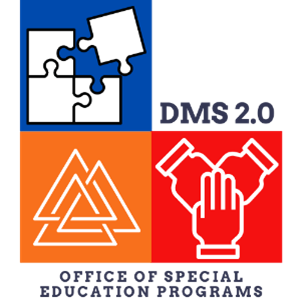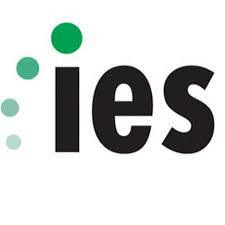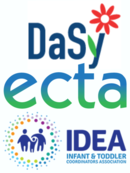In This Issue:
From the Director

Message from OSEP Director,
Ms. Valerie C. Williams
Dear Stakeholders!
Happy New Year. I hope you and your family and friends had a happy and safe holiday season. I am thrilled to be at OSEP and have received a warm welcome from my new colleagues at the Department. I am catching up quickly on all the activities that MSIP and RTP have planned for 2022 and beyond and pleased to see that the work of both divisions is proceeding smoothly and as scheduled.
Through my previous work and briefings here at OSEP, I continue to be very impressed by your ongoing commitment to working with children with disabilities. As we enter our third year of living with the COVID-19 virus, I greatly appreciate everyone’s work to educate our nation’s students. Because of the COVID-19 pandemic, the provision of early intervention and special education services has changed dramatically—sometimes for the better, such as providing virtual therapies for infants and toddlers that has resulted in far fewer missed services. Going into 2022 we need to build upon lessons learned to ensure that children with disabilities receive FAPE and address the learning loss caused by the pandemic. This must be a top priority.
Later this month, we will honor and celebrate Dr. Martin Luther King Jr.’s birthday. A guiding force for me is responding to Dr. King’s belief that “Life’s most persistent and urgent question is, ‘What are you doing for others?” Staff at OSEP have shown me the IDEA data on discipline rates, and it is wholly unacceptable that 45 percent of all children with disabilities who are suspended or expelled for more than 10 days are African American children. This year I will be asking you, collectively, what are we doing and how can we do better for our nation’s children with disabilities.
As OSEP Director, I am not here to return to ‘business as usual.’ The old system worked for some, but not for all. While we’re in a moment of reflection, intentionality, and change, let’s go from where we were to someplace even better. I’m committed to supporting our building leaders, educators, specialized instructional support personnel, paraprofessionals, and all those who impact our students.
In solidarity,
Valerie
|
ED Update

Superintendents Staying the Course Towards Equitable Outcomes for All
On Thursday, January 27th, 2022 from 1:00pm to 2:30pm ET, the Midwest and Plains Equity Assistance Center (MAP Center: EAC Region III) will host a virtual professional learning event to discuss the pivotal role superintendents play, as well as the unique challenges they face in ensuring school communities stay the course towards addressing systemic barriers that prevent all students from benefiting from high-quality learning experiences. Presenters will share key actions that superintendents may take to lead equity-driven efforts.
To register, click here.
|
Announcements
Technical Assistance (TA) Calls
Next TA Calls:
- January 27, 2022 at 4:00–5:00pm (EDT)
Happy New Year! There will be one January OSEP National TA call on DMS 2.0 activities. As part of the Universal TA, the DMS National TA calls will provide guidance on specific puzzle pieces in coordination with our Phase I monitoring activities, or other guidance related to DMS 2.0
- February 10, 2022 at 4:00–5:00pm (EDT)
Please join us for the February OSEP National TA Call where we will review important requirements for the completion of the FFY 2022 IDEA Part B and Part C grant applications. We expect to post the new Grant Award packages on IDEA Website no later than Friday, January 28. In addition, we will share information gathered from review of states’ Part C Section III/ARP documents. These documents specify how Part C programs planned to use their ARP funds. We will provide guidance on these expenditures; revisit the FAQs on costs requiring prior approval; and describe ways in which to document information on Section III of the Part C grant application.
Previous TA Calls:
(All National TA calls are recorded and typically posted within a week)
 |
State Performance Plans / Annual Performance Reports (APRs)
The EDFacts Metadata and Process System (EMAPS) opened on December 20, 2021, for States to begin uploading their next SPP/APR submission due on February 1, 2022. Information on the new SPP/APR submission package are posted on our IDEA Website.
Federal Fiscal Year 2019 Indicator Analysis
In collaboration with OSEP-funded TA Centers, OSEP annually publishes an analysis consisting of an explanation of the reported federal fiscal year indicator measures, data sources for reporting, any variations in State approaches to the reported federal fiscal year’s data collection or measurement, review of six-year trends (reported federal fiscal year and 5 years prior data) in means and ranges, patterns and trends from prior year’s data in comparison to the reported federal fiscal year’s data (including progress and slippage), other relevant indicator data comparisons, and a brief conclusions/summary of the indicator report. The Indicator Analysis chapters are available via the following links:
Federal Fiscal Year 2019 Indicator Analysis — Part B
Federal Fiscal Year 2019 Indicator Analysis — Part C
Please reach out to your State Lead should you have any questions.
 |
IDEA Part B/C Grants
OSEP will present on the 2022 Grant Application process during the February 10, 2022, OSEP National TA Call.
 |

Differentiated Monitoring and Support (DMS)
New DMS Resources Have Been Posted on the DMS Section of Our IDEA website!
OSEP’s next Technical Assistance (TA) Call on DMS is scheduled for January 27, 2022, and will review the Data and SPP/APR Protocol, providing a walkthrough of the overarching questions and previous findings made related to Data and the SPP/APR. Please check the OSEP Monthly TA Call page to register for the calls, review previously recorded calls, and access the TA Call schedule.
NEW! OSEP Has Posted the “Document Review and Request Template.”
We encourage all States to review this document in preparation for their monitoring visits and preparing for DMS 2.0 activities. OSEP will provide a populated copy of this document to States at the beginning of their Phase 1 DMS 2.0 monitoring engagement. To find this resource and other documents related to monitoring activities (e.g., DMS 2.0, DMS Reports, and older monitoring reports, etc.), please refer to the DMS section on our IDEA website.
|
Dose of Data

REMINDER: EDFacts Information Collection Package
The EDFacts Information Collection Package for SYs 2022–23, 2023–24, and 2024–25 is open for the 60-day public comment period until January 14, 2022. The EDFacts Information Collection Package includes all the Part B IDEA Section 618 data collections (i.e., Part B Child Count and Educational Environments, Part B Personnel, Part B Exiting, Part B Discipline, Part B Assessment, Part B Dispute Resolution, and the Part B Maintenance of Effort Reduction (MOE) and Coordinated Early Intervention Services (CEIS)).
Comments in response to this notice must be submitted electronically through Regulations.gov.
|
Recommended Resources

Centralized Systems that Promote #DeafSuccess at Colleges and Universities
The National Deaf Center on Postsecondary Outcomes (NDC) partnered with the National Association for the Deaf (NAD) to explain how best to provide accessibility for deaf students and how to make the most of your budget through a centralized system. Centralized systems, policies, and procedures can benefit schools by creating practical approaches that reduce potential gaps in a student’s education, avoid legal ramifications, and support inclusion of diverse student populations.
To watch the webinar and read more about centralized systems read here.
|
#DeafSuccess
While more than 200,000 deaf students attend colleges nationwide, many colleges and universities are often not prepared to support deaf students in all parts of their college experience. The access needed should not be dependent on each department or club budget to cover the costs for services — whether that be captioned media, speech-to-text services, or interpreters. Centralized systems, policies, and procedures can benefit schools by creating practical approaches that reduce potential gaps in a student’s education, avoid legal ramifications, and support inclusion of diverse student populations.
Watch the full presentation on centralized systems that promote #DeafSuccess at colleges and universities here.

REL Report: Full-Day Kindergarten in Oregon
In partnership with the Oregon Department of Education, REL Northwest conducted a study to understand which districts offered full-day kindergarten before the shift, how those programs were structured, the impact of attending full-day kindergarten on student outcomes in one district, and how full-day kindergarten programs were implemented after the policy shift.
|


Improved Mathematics Outcomes Using Active Implementation: Kentucky’s Effective and Durable Change
Kentucky educators are defying the odds with focus, persistence, and a collective commitment to results driven accountability. This brief, published December 2021, presents the results from an evaluation of four school districts' efforts to improve mathematics achievement for priority populations, specifically students with disabilities and Black students
|
|

























